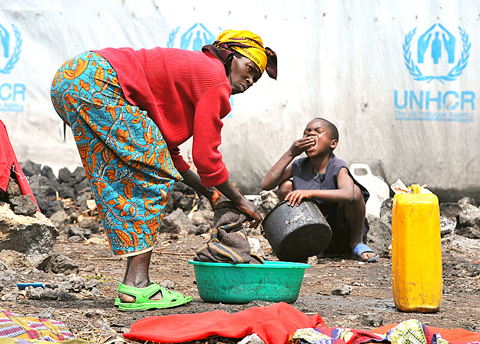The Democratic Republic of the Congo (DR Congo) government and rebel negotiators will meet in Kenya at the start of next week to formalize an uneasy ceasefire, Kinshasa’s foreign minister announced on Friday.
After two days of talks with his Rwandan counterpart Rosemary Museminali, Congolese Foreign Minister Alexis Thambe Mwamba also said that a plan had been agreed with Rwanda to fight enemies of Kigali operating in troubled Nord-Kivu.
A diplomatic source said that neither Congolese President Joseph Kabila nor rebel leader Laurent Nkunda would attend the first direct talks on Monday between the warring sides since renewed hostilities broke out in August.

PHOTO: AFP
The fighting has displaced well over a quarter of a million people, and the UN refugee agency said on Friday more than 90,000 people were missing after three makeshift refugee camps in rebel-held areas of Nord-Kivu were found empty.
“A meeting will take place between representatives of the government of DR Congo and the CNDP [National Congress for the Defense of the People], under the auspices of the United Nations and the mediator on December 8 in Nairobi,” Mwamba said.
Adding that the aim was to “formalize the ceasefire” declared unilaterally by Nkunda’s rebels at the end of October — since broken by both sides — Mwamba said that the parties would “discuss a roadmap towards peace.”
Nkunda, a Tutsi who claims to be defending his people against the Rwandan Hutus, has long demanded direct talks, whereas Kinshasa had held out for negotiations involving the plethora of armed groups in the region.
The Congolese government later said it had not changed its position since it intended to meet all armed groups active in the country’s east, starting with Nkunda’s.
“We’re going to receive all the armed groups separately and we will begin with Laurent Nkunda’s group Monday in Nairobi,” government spokesman Lambert Mende said.
“We are not abandoning the Amani program,” he said, referring to a forum for peace negotiations grouping different armed factions from across Nord-Kivu and Sud-Kivu province.
Friday’s announcement followed two visits to the country by UN mediator Olusegun Obasanjo, the former president of Nigeria, who has twice met separately with both Kabila and Nkunda.
A joint statement by Mwamba and Museminali said that Kigali and Kinshasa had agreed on military cooperation targeting Rwandan Hutus who fled to DR Congo after a Tutsi rebellion took control in Rwanda in the wake of the country’s genocide 14 years ago.
Some 800,000 mainly Tutsis were killed by Hutu extremists in a three-month orgy of killing in 1994.
“The two sides have drawn up a detailed plan of operations against ex-soldiers of the Rwandan armed forces, Interhamwe militia and Democratic Forces for the Liberation of Rwanda [FDLR],” a joint statement said.
Kigali has demanded for years that Kinshasa disarm the Hutus, which Nkunda claims are being supported by Congo government forces. Kinshasa for its part accuses Kigali of backing Nkunda’s rebellion, which Rwanda denies.
A diplomatic source in Goma said the military operation against the FDLR would begin early in the new year and would be jointly led by the UN peacekeeping force known as MONUC and the Congolese army, with “significant” input from the Rwandans.
The Rwandan army would provide logistic, intelligence and other support, but “the idea is to avoid the deployment of Rwandan troops on Congolese soil,” the source said.

In the sweltering streets of Jakarta, buskers carry towering, hollow puppets and pass around a bucket for donations. Now, they fear becoming outlaws. City authorities said they would crack down on use of the sacred ondel-ondel puppets, which can stand as tall as a truck, and they are drafting legislation to remove what they view as a street nuisance. Performances featuring the puppets — originally used by Jakarta’s Betawi people to ward off evil spirits — would be allowed only at set events. The ban could leave many ondel-ondel buskers in Jakarta jobless. “I am confused and anxious. I fear getting raided or even

Kemal Ozdemir looked up at the bare peaks of Mount Cilo in Turkey’s Kurdish majority southeast. “There were glaciers 10 years ago,” he recalled under a cloudless sky. A mountain guide for 15 years, Ozdemir then turned toward the torrent carrying dozens of blocks of ice below a slope covered with grass and rocks — a sign of glacier loss being exacerbated by global warming. “You can see that there are quite a few pieces of glacier in the water right now ... the reason why the waterfalls flow lushly actually shows us how fast the ice is melting,” he said.

Eleven people, including a former minister, were arrested in Serbia on Friday over a train station disaster in which 16 people died. The concrete canopy of the newly renovated station in the northern city of Novi Sad collapsed on Nov. 1, 2024 in a disaster widely blamed on corruption and poor oversight. It sparked a wave of student-led protests and led to the resignation of then-Serbian prime minister Milos Vucevic and the fall of his government. The public prosecutor’s office in Novi Sad opened an investigation into the accident and deaths. In February, the public prosecutor’s office for organized crime opened another probe into

RISING RACISM: A Japanese group called on China to assure safety in the country, while the Chinese embassy in Tokyo urged action against a ‘surge in xenophobia’ A Japanese woman living in China was attacked and injured by a man in a subway station in Suzhou, China, Japanese media said, hours after two Chinese men were seriously injured in violence in Tokyo. The attacks on Thursday raised concern about xenophobic sentiment in China and Japan that have been blamed for assaults in both countries. It was the third attack involving Japanese living in China since last year. In the two previous cases in China, Chinese authorities have insisted they were isolated incidents. Japanese broadcaster NHK did not identify the woman injured in Suzhou by name, but, citing the Japanese